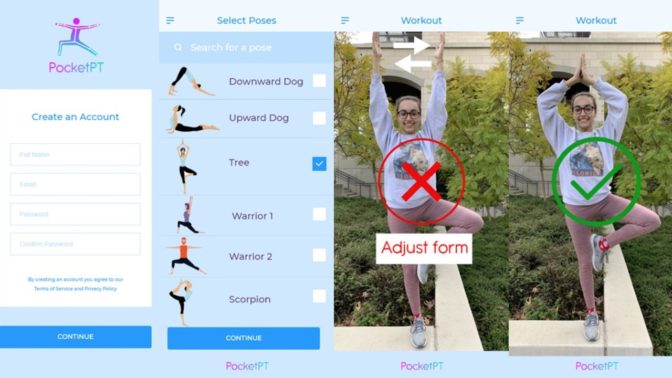The four undergrads met for the first at the Stanford TreeHacks hackathon, became close friends, and developed an AI-powered app to help physical therapy patients ensure correct posture for their at-home exercises — all within 36 hours.
Back in February, just before the lockdown, Shachi Champaneri, Lilliana de Souza, Riley Howk and Deepa Marti happened to sit across from each other at the event’s introductory session and almost immediately decided to form a team for the competition.
Together, they created PocketPT, an app that lets users know whether they’re completing a physical therapy exercise with the correct posture and form. It captured two prizes against a crowded field, and inspired them to continue using AI to help others.
The app’s AI model uses the NVIDIA Jetson Nano developer kit to detect a user doing the tree pose, a position known to increase shoulder muscle strength and improve balance. The Jetson Nano performs image classification so the model can tell whether the pose is being done correctly based on 100+ images it was trained on, which the team took of themselves. Then, it provides feedback to the user, letting them know if they should adjust their form.
“It can be taxing for patients to go to the physical therapist often, both financially and physically,” said Howk.
Continuing exercises at home is a crucial part of recovery for physical therapy patients, but doing them incorrectly can actually hinder progress, she explained.
Bringing the Idea to Life
In the months leading up to the hackathon, Howk, a rising senior at the University of Alabama, was interning in Los Angeles, where a yoga studio is virtually on every corner. She’d arrived at the competition with the idea to create some kind of yoga app, but it wasn’t until the team came across the NVIDIA table at the hackathon’s sponsor fair that they realized the idea’s potential to expand and help those in need.
“A demo of the Jetson Nano displayed how the system can track bodily movement down to the joint,” said Marti, a rising sophomore at UC Davis. “That’s what sparked the possibility of making a physical therapy app, rather than limiting it to yoga.”
None of the team members had prior experience working with deep learning and computer vision, so they faced the challenge of learning how to implement the model in such a short period of time.
“The NVIDIA mentors were really helpful,” said Champaneri, a rising senior at UC Davis. “They put together a tutorial guide on how to use the Nano that gave us the right footing and outline to follow and implement the idea.”
Over the first night of the hackathon, the team took NVIDIA’s Deep Learning Institute course on getting started with AI on the Jetson Nano. They’d grasped the basics of deep learning. The next morning, they began hacking and training the model with images of themselves displaying correct versus incorrect exercise poses.
In just 36 hours since the idea first emerged, PocketPT was born.
Winning More Than Just Awards
The most exciting part of the weekend was finding out the team had made it to final pitches, according to Howk. They presented their project in front of a crowd of 500 and later found out that it had won the two prizes.
The hackathon attracted 197 projects. Competing against 65 other projects in the Medical Access category — many of which used cloud or other platforms — their project took home the category’s grand prize. It was also chosen as the “Best Use of Jetson Hack,” among 11 other groups that borrowed a Jetson for their projects.
But the quartet is looking to do more with their app than win awards.
Because of the fast-paced nature of the hackathon, PocketPT was only able to fully implement one pose, with others still in the works. However, the team is committed to expanding the product and promoting their overall mission of making physical therapy easily accessible to all.
While the hackathon took place just before the COVID outbreak in the U.S., the team highlighted how their project seems to be all the more relevant now.
“We didn’t even realize we were developing something that would become the future, which is telemedicine,” said de Souza, a rising senior at Northwestern University. “We were creating an at-home version of PT, which is very much needed right now. It’s definitely worth our time to continue working on this project.”
Read about other Jetson projects on the Jetson community projects page and get acquainted with other developers on the Jetson forum page.
Learn how to get started on a Jetson project of your own on the Jetson developers page.
The post It’s Not Pocket Science: Undergrads at Hackathon Create App to Evaluate At-Home Physical Therapy Exercises appeared first on The Official NVIDIA Blog.

